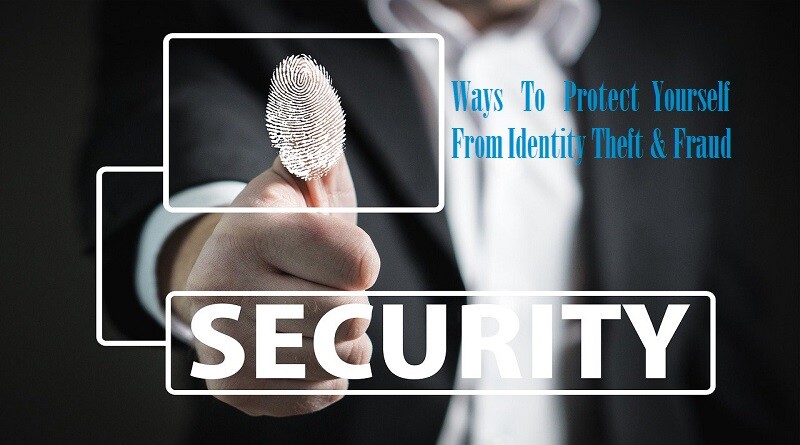Ways To Protect Yourself From Identity Theft and Fraud
Identity Theft Is A New Term But A Wider Old Practice! Like most of the people view that Identity Theft is an issue that relates with the mature people holding credit records, but if you have a social security number, you could become a victim at any time. Mother of a newly born baby ask a question online that ˜How can I protect my newborn daughter from identity theft?˜ This is not merely a question but it is a doubt over a society that have some black sheep among us who don’t spare any one and even a child who has not ability to think about how he or she will have for his or her future. Doubt of a mother clearly states that she have gone through with some kind of mishap. Yeah, her identity was being falsely used for credit purposes when she was just 11 or 12 and she have one option left like to credit freeze to safe guard her child from being affected by this unhappy situation. Her motherhood will not keep her calm from her uneasy mind board that is creating horror graphs but she will be OK by paying a fee to cover her daughter’s identity protection while freezing her credit till she will not grown up to protect or need any credit for herself. Do you think this should be a solution to pay a fee to merely an identity save when we know there are plenty of expenses that we need to cover-up our livings? No, because if everyone will do it then every child with his/her fellow friend will reply in exchange of a hello, yes I am fine so do my credit.. Anyhow, either you have become a victim or have a threat, you should know where to ask for a help and how to get rid from identity theft issue.
Where if today’s advancement in technology has created so much fun doing assorted things to make our lives more productive, simple and fast then on the other hand it also created a great troubling concerns to today’s information economy with the possibility of identity theft that could make our life unproductive, complicated and slow. As an identity theft is a worldwide threatening issue but it has become most popular crime in Canada as well, according to phone fraud statistics 2007, there were nearly 8000 victims reported in the year 2006 throughout Canada who launched identity theft complaints for the loss of more than $16 million hard earn money, Ontario stands in the top affected province, where 43 percent from this Canadian phone fraud statistics lost 47 percent of the total revenue. Moreover, technology advancement may have greater share for overall risk of identity theft but it is not responsible for all the attacks over your privacy and security, the most responsibility goes to human interaction while asking for information and this social engineering holds various loops and pools.
Using another person’s or business entity’s identity fraudulently like misrepresentation, stealing or hijacking to achieve financial and other unlawful benefits to commit a crime. Identity theft may be sub-divided into following three categories:
Economical Identity Fraud involves financial benefits in which using another person’s name or business to obtain a credit or merchandise in the form of goods and services.
Social Identity Fraud involves Identity Cloning in which someone poses his or her identity in daily life to get some benefits he or she may not get like special class, field or designation.
Criminal Identity Fraud involves committing a crime using another identity. Although identity theft is an itself a crime, but criminal nature some time makes it maximum penalty crime like dacoity, terrorism, etc.
Identity Protection Legal Aspects
In Canada, each province has its own privacy law and privacy commissioners to limit the storage and use of personal data while you have right to access and correct that information while launching a request and complain to the privacy commissioner of your province, beside federal legislation’s Privacy Act deals with the federal government, its agencies and crown corporations exclusively. To be brief, Canadian law requires individual consent for collecting, sharing and managing your personal information.
Criminal Code of Canada under section 403 clearly states; Every one who fraudulently personates any person, living or dead,
(a) with intent to gain advantage for himself or another person,
(b) with intent to obtain any property or an interest in any property, or
(c) with intent to cause disadvantage to the person whom he personates or another person, is guilty of an indictable offense and liable to imprisonment for a term not exceeding ten years or an offense punishable on summary conviction.
When, Where and How Infringement Of Rights Occur
Important and sensitive information can be easily accessed by anyone who has your social security number, social insurance number and other identifying information such as credit card bills or processed checks to further obtain your name, address, date of birth, and mother’s maiden name that may help the identity thief to acquire unlawful benefits over your property and proprietary rights.
Due to the most usage and being a handy credit instrument a Credit Card have become most common and favorite form of credit card fraud for identity thieves which is an easy to target, beside your identity thief can take over your financial accounts, apply for loans, purchase vehicles, open new bank accounts or transfer accounts, shopping other products and services online or offline.
Tips for Identity Theft Prevention And Protection
- Be aware of your credit report with updated information, always check your credit report with regular intervals.
- Don’t keep your incoming new and renewed credit cards unsigned.
- Safeguard your personal information to be accessed by other people in your shared apartment, office and outdoors. Never leave receipts at bank machines, in trashcans, at public dump sites, or staying at your table, ensure and destroy paperwork you no longer need.
- Do not carry the personal documents or a written record except when needed. Your Social Security card, birth certificate, bank PIN number(s), computer passwords, passport or credit cards could cause you a heavy loss if stolen or lost. Minimize the risk by carrying only useful things with you or in your wallet or handbag, you can remember.
- Check and collect your mails from your mailbox regularly by yourself or someone you trust to pick it up and if you are getting your mails other than a post office box into your mail box then always lock it properly.
- Always prefer to collect credit instruments personally other than mailing, like picking up your new check/cheque book at a bank is more favorable then mailing.
- Using more than one credit card makes hard to maintain and supervise, so try to reduce the number of credit cards in your usage.
- Close all your unnecessary credit accounts with your bank or other financial institution that you don’t use or require more.
- Make a list of all of your investments, credit card numbers, passwords, user names and bank account numbers and guard them in a safe place. It is preferred to make a single file as a record that you can easily manage and protect under lock and key. Do not keep them on your computer with out password protected. Moreover, place your file containing sensitive information and record away at inaccessible location while using peer-to-peer file sharing software.
- Always properly log-off your email account or other services you are using online, especially while using computer clubs at public places.
- Never give or loan your credit cards.
- Do not disclose your personal information such as SSN, SIN, date of birth, credit card details, or PIN over the telephone or an email unless you don’t feel secure and sure about the authority.
- Before throwing away anything with private information, shred or otherwise destroy it. Remember, shredding your old bills, pre-approved credit card applications, invoices, receipts, credit & bank statements when no longer needed, is the first and possibly most effective way to stop being robed by dumpster divers to access your information.
- Before moving to a new and permanent place ask to change your new mailing address and inform all of your credit cards, banks, subscriptions services along with the post office personally of your new address.
- In case of credit card is lost or stolen and any other discrepancies you find in your monthly statements, your quick response to report the issuing credit card company is needed to minimize the damage.
- Be careful while disclosing and posting your personal information online while using social network web sites like MySpace, StumbleUpon, FaceBook, Perfspot, Bebo etc.
- Treat your checks/cheques like money. Do not drop them off at the post office or order your checks via web or ordinary mail, always have them delivered via registered mail or a courier service. Remember, mail theft is probably easier than dumpster diving when it comes to stealing private information, and much cleaner.
- When using an ATM pay special attention to those standing next to you. If someone is standing too close behind you, do not feel hesitation in asking them to step back.
Tips for Identity Theft Victims
One of the best tip for those people who have become victim of an identity theft, they should instantly report their problem to the legal authority by searching online and to avoid further threat they should care taking every possible way to protect them selves from happening bad in future and if possible they should take identity protection shield or protection service.




